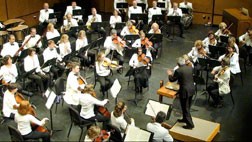You’ve Come A Long Way, Baby!
- Share
- Tweet
- Pin
- Share

If it were a person rather than an August cultural phenomenon in Door County, the Peninsula Music Festival (PMF) would now be eligible for Social Security. But with a nearly full house as this season opened August 5, the PMF seems to be getting younger and younger.
The Door Community Auditorium concert hall is a hidden gem tucked away in the Gibraltar School complex, and the symphonic music performed by a chamber orchestra made up of musicians from all over the United States, a sparkling delight to visitors new to the peninsula.
But long-time season ticket holders remember the early days of the festival when the audience sat on folding chairs in a gym, the basketball hoop raised for the occasion, and the scoreboard temporarily concealed under a wrap. You’ve come a long way, baby!
After the orchestra stood to play the traditional opening “Star-Spangled Banner” and the audience rose to their feet to sing, long-time conductor Victor Yampolsky’s program of tradition symphonic music began with Ludwig van Beethoven’s Overture to Johann Wolfgang von Goethe’s play Egmont. In the plot, Dutch warrior Count Egmont futilely opposes a Spanish invader and ultimatly accepts a death sentence as a martyr rather than abandoning his dream of victory over oppression. The colorfully dramatic overture underscores the themes that develop in Goethe’s tragic drama.
Beethoven was rumored to have written his Symphony No. 4 in B-flat major, inspired by his engagement to Therese, sister to his friend Count Brunsvick. But as Richard Rodda writes in his program notes, the relationship was a hoax. Beethoven’s “Immortal Beloved” was a married woman and the symphony not a “musical love child,” but simply a celebration of “the most halcyon time of Beethoven’s life.”
Subsequently, the four-movement score of this middle piece on the program has a sunny and light tone, the second adagio especially lovely and lyrical, and the allegro, a finale that races headlong, the strings at times literally buzzing with electric energy.
The audience’s favorite of the evening’s program was Johannes Brahms Violin Concerto in D major, the orchestra providing a set piece for soloist Vadim Gluzman. A special chemistry appeared to exist between the conductor and soloist, perhaps in part from their common roots. Yampolsky was born in the Soviet Union but emigrated to the United States in 1973; Gluzman was also born in the USSR (coincidentally during the year of Yampolsky left that country) and moved to Israel in 1990. He later studied in the US at the Juilliard School.
The celebrated violinist pleased his Door County audience not only with his impressive virtuosity on his instrument, but also with his showmanship, his emotional connection with the concerto evident in his body language and facial expression, as if he were levitated by the orchestral introduction and then soared airborne until the resolution.
Brahms’ concerto was dedicated to his friend violinist Joseph Joachim who collaborated with him in perfecting the final score, one that with multiple double stops and rapid fire scale passages presents formidable challenges to a soloist.
The first movement allegro begins with a soulfully tormented mood that continues into a plaintive adagio, and then resolves happily in the final allegro with a whirling gypsy-dance, the best-known section of the concerto; it inspired the Andrew Lloyd Webber/Tim Rice song “Don’t Cry for Me Argentina” for the musical Evita and was used in Paul Thomas Anderson’s 2007 movie There Will Be Blood.
Rodda calls this movement “a memorable capstone to one of the greatest concerteo pieces of the 19th century.” The PMF audience apparently agreed as they collectively sprang to their feet with applause and brought Gluzman back for additional bows.
This 62nd season of the Peninsula Music Festival offers nine concerts over a three-week period ending August 23rd. For more information or to purchase tickets, visit musicfestival.com, call 920.854.4060, or stop by the PMF office at 10347 N. Water Street, Unit B, Ephraim.


